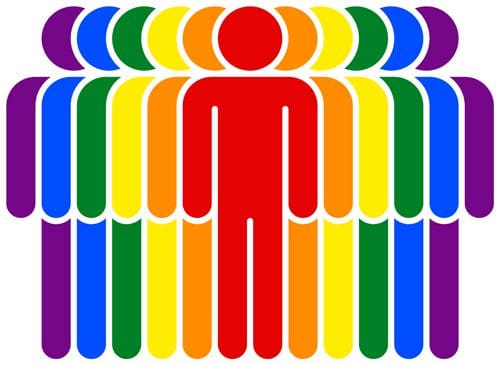For many years, the popular belief has been that substance abuse was higher in the LGBTQ (lesbian, gay, bisexual, transgender, queer/questioning) community.
Now, statistics provided by the 2015 National Survey on Drug Use and Health and reviewed by the Substance Abuse and Mental Health Services Administration show the belief to be correct.
According to the survey (Table B.4), members of the LGBTQ community aged 18 or older who have used illicit drugs is 39% compared 17% of their heterosexual counterparts.
Additional statistics are just as alarming:
- Illicit drug use in the past among LGBTQ adults ages 18 – 25 is 54% compared to 36% in the heterosexual population
- Binge alcohol Use: 64% compared to 56.%
- Heavy alcohol use: 8% compared to 7%
The NSDUH survey did not include any questions that identify transgender or queer/questioning people, so those members of the LGBTQ community were not included in the statistics.
Stress as a Cause of Substance Abuse in the LGBTQ Community
If you or your loved one identify as a member of the LGBTQ community, you are aware of the many areas of stress that are encountered on an almost daily basis. Even for those who have a strong support system and are accepted and loved by their family and friends, stress and uncertainty are part of everyday life.
In the workplace, many members of the LGBTQ community must hide their sexual orientation because of discrimination, harassment, and bullying. Many live with the fear of losing their jobs since it is legal to fire an individual based on gender identity or sexual orientation in 28 states.
In October 2017, CareerBuilder released a survey of 3,420 full-time workers that showed that 56% of all workers who are gay, lesbian, bisexual, or transgender are repeatedly bullied at their jobs. A study conducted by an LGBT consulting firm, Out Now, showed that fewer LGBT Americans (38% in 2015 compared to 44% in 2010) share their sexual orientation or gender identity with coworkers because they do not feel comfortable. Out Now reports that “One possible explanation for that figure: nearly half of LGBT U.S. workers reported having heard something homophobic in the workplace in the past year.”
In addition to workplace stress, there are many other causes of stress faced by the LGBTQ community. Although everyone does not face identical stressors, several of the more common ones include:
- Facing rejection or feelings of shame from family, friends, or spiritual community after coming out
- Fearing violent behavior, hate crimes, or physical assault
- Dealing with emotional and physical abuse, public humiliation or discrimination, threats, or ridicule
- Being excluded from activities, social groups, or religious organizations
- Internalizing feelings of self-hatred or homophobia
- Leading a “closeted life” and hiding their sexuality resulting in a double life because of the fear of rejection and discrimination
Many members of the LGBTQ community also deal with prejudice and discrimination regarding health care services. Some healthcare professionals do not understand, or take seriously, the specific needs of the LGBTQ population, and individuals often have challenges in finding the healthcare they need without judgment, prejudice, or bias. Insurance companies that do not provide coverage for same-sex partners also cause a great deal of stress to members of the community.
Oftentimes, LGBTQ individuals turn to alcohol or drugs as a way to self-medicate and block out the stigmatization and prejudice they face in society every day. Using these substances temporarily takes away the feelings of depression, anger, fear, or anxiety they may be experiencing.
What to Look for in a Treatment Center that is LGBTQ Friendly
How does a member of the LGBTQ community go about finding a treatment center that is accepting and supportive of them? How do they know what to look for?
In an article written by Cindy Spiegel, for Mountain Laurel Recovery Center, there is an extensive list she compiled from an article in Social Work Today and A Provider’s Guide to Substance Abuse Treatment for Lesbian, Gay, Transgender, and Bisexual Individuals, published by SAMHSA.
For individuals of the LGBTQ community seeking treatment of a substance abuse addiction, it is essential to find a residential facility that can truly meet the needs of the person.
- Staff at the treatment center must be sensitive to the specific needs of the individual and of the community as a whole.
- There must be an understanding of the individual’s particular personal, psychological, and social needs and challenges.
- The program must be able to treat and provide support to overcome any specific issues that may arise during and after treatment.
- The facility must be able to treat people with dual diagnosis, as many LGBTQ individuals who suffer from substance abuse problems are also dealing with depression, anxiety, or other mental health issues.
Although Canyon Vista Recovery Center, located in Mesa, Arizona, does not offer specific programming for LGBTQ individuals at this time, they welcome people from all walks of life without discrimination or prejudice. The program offers a full continuum of care that includes traditional and advanced holistic therapies, intense trauma focus, family healing work, development of important life skills, and physical wellness, and Extended Care Treatment. If you or a loved one is a member of the LGBTQ community and is suffering from addiction, get in touch with an admissions counselor at Canyon Vista. They would be happy to speak with you about their programs and how they can help.











